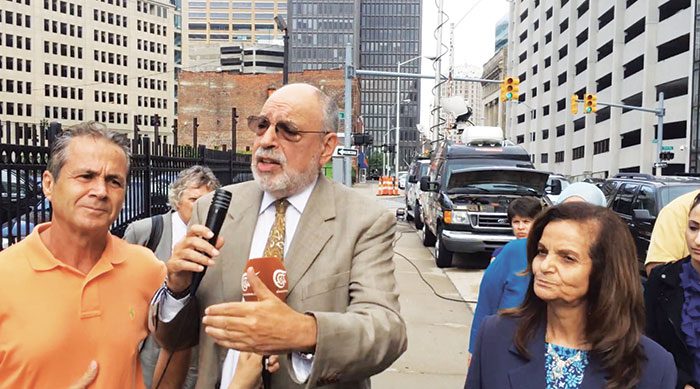
|
| Rasmea Odeh (R) standing next to her lead attorney Michael Deutsch in Detroit last month. |
DETROIT — The judge in Rasmea Odeh’s case announced a string of pretrial decisions in favor of the prosecution on Monday, disallowing the introduction of evidence that Odeh’s attorneys had deemed “essential” to her defense.
Odeh, a Palestinian American activist who lives in Chicago, is accused of lying on her U.S. naturalization application about being arrested and convicted in Israel about 45 years ago. Her supporters describe the indictment as a “political witch-hunt” to deal a blow to Palestinian activism in the United States.
The decisions unfavorable to the defense came eight days before the start of the trial on Nov. 4.
U.S. District Judge Gershwin A. Drain ruled against allowing the testimony of a psychological expert who diagnosed Odeh and was going to tell the jury that the defendant suffers from Post Traumatic Stress Disorder, which could have affected her interpretation of the citizenship application.
Dr. Mary Fabri, a clinical psychologist at the Kovler Center in Chicago, told the judge last week that people with PTSD often develop filters that helps them avoid reminders of past trauma that caused the disorder.
Drain granted a motion by the prosecution to exclude evidence indicating that Odeh was tortured in Israeli prisons. Odeh says she was tortured and sexually abused by Israeli military officers, who forced a confession out of her about membership in the Popular Front of the Liberation of Palestine (PFLP) and participating in two bombings.
In his ruling, Drain wrote that torture and rape are “antithetical to the concepts of fairness, due process and basic human rights.” He added that the court accepts Odeh’s claims as “credible.”
“[The court] is not unaffected by the inhumane circumstances of her detention in the West Bank,” the ruling reads. However, the judge added that he wants the proceedings to focus on the charges leveled against Odeh here, not the circumstances of her trial in Israel.
“By precluding from the trial any mention of torture, the court has gutted the heart of Rasmea’s defense and makes a fair trial impossible,” Odeh’s lead attorney, Michael Deutsch, told The Electronic Intifada on Tuesday.
The judge also overturned his own decision on whether “specific intent” must be proven to convict Odeh. Two weeks ago, the court gave a boost to Odeh’s defense by requiring the prosecution to prove that she willfully lied on her application in order procure citizenship. Now the prosecution only has to prove that Odeh knowingly lied on her citizenship, regardless of her motives.
The court found a “palpable defect,” an obvious mistake, in its earlier judgment on intent after the prosecution filed a motion asking the judge to reconsider his decision.
Deutsch had filed a motion to exclude evidence from Odeh’s trial in Israel because the judicial practices of the military court that tried her violate the U.S. Constitution.
The judge denied the motion, allowing the introduction of evidence from Odeh’s 1969 trial in accordance with the Mutual Legal Assistance Treaty between the United States and Israel.
Drain’s only decision in favor of Odeh was his ruling to bar the prosecution from mentioning terrorism in front of the jury.
The Rasmea Defense Committee reacted angrily to the rulings, describing them as “outrageous, vicious and unjust.”
“The government is going all out to railroad Rasmea, to jail and deport her,” the committee said in a statement. “There was nothing fair about her being indicted on trumped-up immigration charges in the first place. The recent rulings by Judge Drain indicate that there will be nothing fair about Rasmea’s trial, either.”
Odeh’s supporters have been protesting in front of the federal courthouse in Detroit before every hearing. The Rasmea Defense Committee renewed the call for demonstrations and attending the proceedings of the trial, which starts next week.
“Determined and collective action by those of us who yearn for justice, and civil and human rights, is imperative,” said a statement by the committee. “We must fill the streets around the courthouse in Detroit, pack the courtroom during the trial, and organize demonstrations around the country. If there is to be a measure of justice in this case, we are the ones who must provide it.”
The Rasmea Defense Committee is holding a fundraiser for Odeh at Beit Hanina Outreach Community Center in Dearborn on Sunday, Nov. 2, at 6 p.m.






Leave a Reply